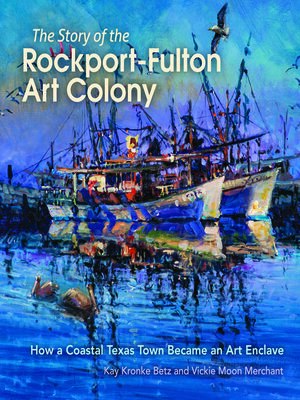The Story of the Rockport-Fulton Art Colony
ebook ∣ How a Coastal Texas Town Became an Art Enclave
By Kay Kronke Betz

Sign up to save your library
With an OverDrive account, you can save your favorite libraries for at-a-glance information about availability. Find out more about OverDrive accounts.
Find this title in Libby, the library reading app by OverDrive.



Search for a digital library with this title
Title found at these libraries:
| Library Name | Distance |
|---|---|
| Loading... |
When Coastal Living Magazine listed Rockport, Texas, among its "Top 10 Coastal Artists' Colonies" with more well-known art communities such as Carmel-by-the-Sea, California, and Monhegan Island, Maine, many art lovers may have been surprised. But Rockport's inclusion represented an emerging Texas Gulf Coast aesthetic and regional school of landscape art that many art historians and collectors had discovered. The area's unique ecosystem, abundance of wildlife and quaint architecture of bait stands and fish houses became a haven for creativity and individuality, beginning in the late forties.
Over the years, it became home to influential artists, including the colony founder, Simon Michael, his most famous student, Dalhart Windberg, Jack Cowan, Al Barnes, Herb Booth, and Jesus Moroles. Other prominent artists also came for inspiration, including Buck Schiwetz, Harold Phenix, and Kent Ullberg. Many of the artists were active in early environmental organizations like the Coastal Conservation Association and Ducks Unlimited, working to protect the special habitats. And Steve Russell, a Rockport native, became the legendary mentor and quintessential artist of the colony, inspiring generations of newcomers.
In The Story of the Rockport-Fulton Art Colony: How a Coastal Texas Town Became an Art Enclave, Kay Kronke Betz and Vickie Moon Merchant chronicle how this small Texas town, whose economy was based on fishing, shrimping, and tourism, became a major regional center for the visual arts. Generously illustrated throughout with full-color images of boats, bays, and other hallmarks of this artistically rich community, this book is a visual and narrative treat for art lovers, conservationists, and historians alike.
Over the years, it became home to influential artists, including the colony founder, Simon Michael, his most famous student, Dalhart Windberg, Jack Cowan, Al Barnes, Herb Booth, and Jesus Moroles. Other prominent artists also came for inspiration, including Buck Schiwetz, Harold Phenix, and Kent Ullberg. Many of the artists were active in early environmental organizations like the Coastal Conservation Association and Ducks Unlimited, working to protect the special habitats. And Steve Russell, a Rockport native, became the legendary mentor and quintessential artist of the colony, inspiring generations of newcomers.
In The Story of the Rockport-Fulton Art Colony: How a Coastal Texas Town Became an Art Enclave, Kay Kronke Betz and Vickie Moon Merchant chronicle how this small Texas town, whose economy was based on fishing, shrimping, and tourism, became a major regional center for the visual arts. Generously illustrated throughout with full-color images of boats, bays, and other hallmarks of this artistically rich community, this book is a visual and narrative treat for art lovers, conservationists, and historians alike.







